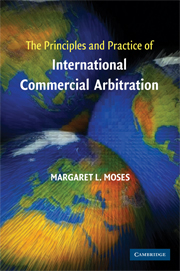Book contents
- Frontmatter
- Contents
- Foreword
- Preface
- 1 Introduction to International Commercial Arbitration
- 2 The Arbitration Agreement
- 3 Drafting the Arbitration Agreement
- 4 Applicable Laws and Rules
- 5 Judicial Assistance for Arbitration
- 6 The Tribunal
- 7 The Arbitral Proceedings
- 8 The Award
- 9 Attempts to Set Aside an Award
- 10 Enforcement of the Award
- 11 Investment Arbitration
- Appendices
- A The United Nations Convention on the Recognition and Enforcement of Foreign Arbitral Awards (The New York Convention) (1958)
- B UNCITRAL Model Law on International Commercial Arbitration (original 1985 version)
- C Annex I: Revised Articles of the UNCITRAL Model Law on International Commercial Arbitration (2006)
- D Annex II: UNCITRAL Recommendation Regarding the Interpretation of Article II, Paragraph 2, and Article VII, Paragraph 1, of the New York Convention
- E IBA Rules on Taking Evidence in International Commercial Arbitration
- F IBA Rules of Ethics for International Arbitrators (1987)
- G IBA Guidelines on Conflicts of Interests in International Arbitration
- H The AAA–ABA Code of Ethics for Arbitrators in Commercial Disputes
- I Model Clauses
- J Useful Arbitration Websites
- Index
G - IBA Guidelines on Conflicts of Interests in International Arbitration
- Frontmatter
- Contents
- Foreword
- Preface
- 1 Introduction to International Commercial Arbitration
- 2 The Arbitration Agreement
- 3 Drafting the Arbitration Agreement
- 4 Applicable Laws and Rules
- 5 Judicial Assistance for Arbitration
- 6 The Tribunal
- 7 The Arbitral Proceedings
- 8 The Award
- 9 Attempts to Set Aside an Award
- 10 Enforcement of the Award
- 11 Investment Arbitration
- Appendices
- A The United Nations Convention on the Recognition and Enforcement of Foreign Arbitral Awards (The New York Convention) (1958)
- B UNCITRAL Model Law on International Commercial Arbitration (original 1985 version)
- C Annex I: Revised Articles of the UNCITRAL Model Law on International Commercial Arbitration (2006)
- D Annex II: UNCITRAL Recommendation Regarding the Interpretation of Article II, Paragraph 2, and Article VII, Paragraph 1, of the New York Convention
- E IBA Rules on Taking Evidence in International Commercial Arbitration
- F IBA Rules of Ethics for International Arbitrators (1987)
- G IBA Guidelines on Conflicts of Interests in International Arbitration
- H The AAA–ABA Code of Ethics for Arbitrators in Commercial Disputes
- I Model Clauses
- J Useful Arbitration Websites
- Index
Summary
Reprinted with permission of the International Bar Association, London. © International Bar Association
Approved on 22 May 2004 by the Council of the International Bar Association.
INTRODUCTION
Problems of conflicts of interest increasingly challenge international arbitration. Arbitrators are often unsure about what facts need to be disclosed, and they may make different choices about disclosures than other arbitrators in the same situation. The growth of international business and the manner in which it is conducted, including interlocking corporate relationships and larger international law firms, have caused more disclosures and have created more difficult conflict of interest issues to determine. Reluctant parties have more opportunities to use challenges of arbitrators to delay arbitrations or to deny the opposing party the arbitrator of its choice. Disclosure of any relationship, no matter how minor or serious, has too often led to objections, challenge and withdrawal or removal of the arbitrator.
Thus, parties, arbitrators, institutions and courts face complex decisions about what to disclose and what standards to apply. In addition, institutions and courts face difficult decisions if an objection or a challenge is made after a disclosure. There is a tension between, on the one hand, the parties' right to disclosure of situations that may reasonably call into question an arbitrator's impartiality or independence and their right to a fair hearing and, on the other hand, the parties' right to select arbitrators of their choosing. Even though laws and arbitration rules provide some standards, there is a lack of detail in their guidance and of uniformity in their application. As a result, quite often members of the international arbitration community apply different standards in making decisions concerning disclosure, objections and challenges.
[…]
- Type
- Chapter
- Information
- Publisher: Cambridge University PressPrint publication year: 2008



